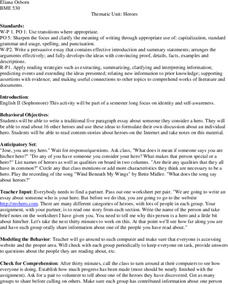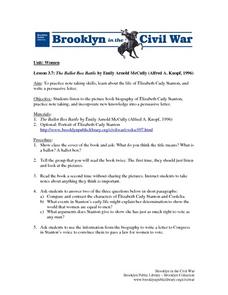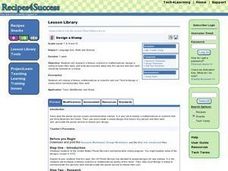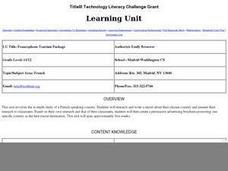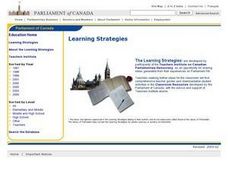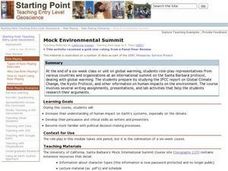Curated OER
Freedom from Oppression
Students investigate instances of genocide and role play as reporters writing news stories and editorials.
Curated OER
Heroes
Tenth graders participate in research and class discussion before attempting to write a traditional five paragraph essay. They use the examples of 16 other hero stories to consider. Students use examples and descriptive details to...
Curated OER
Mardi Gras
Students explain why carnivals and Mardi Gras became a famous celebration. They reproduce some of the traditions and customs related to Mardi Gras. They write a persuasive paper on why or why not we should continue to celebrate Mardi Gras.
Curated OER
"Anything We Love Can Be Saved" -- A Contemporary
High schoolers compare authors Rachel Carson and Mary Eliza Church Terrell. They read an introduction by Alice Walker and summarize the main points. They also identify the language she uses to persuade readers. They write their own...
Curated OER
Mary Eliza Church Terrell -- Civil Rights Leader
Young scholars examine writings of Mary Eliza Church Terrell. They role play themselves as an African American woman in the 19th century. They describe her actions and how they benefited minorities.
Curated OER
Smoke and Mirrors
Students develop a persuasive peer-to-peer case against smoking. They read two scenarios, perform a skit, and prepare a factual presentation.
Curated OER
A Comparison of the Celebrations of Cinco de Mayo
Students compare and contrast how Cinco de Mayo is celebrated in the United States and in Mexico. In this cultural comparisons lesson plan, students research holiday practices using Internet sites and then write persuasive papers that...
Curated OER
The Ballot Box Battle
Pupils practice note taking skills, study the life of Elizabeth Cady Stanton, and write a persuasive letter. They listen to the picture book biography of Elizabeth Cady Stanton and use the information from the biography to write a letter...
Curated OER
Design a Stamp
Students research a famous scientist or mathematician, design a stamp to honor their work, and write persuasively about why this person and their work should be honored on a stamp.
Curated OER
Finding the West
Students question the idea of a geographic space called 'the West.' They first examine a map of the United States and hypothesize what region constitutes the West, then read two passages that critically discuss the notion of a geographic...
Curated OER
The Individual and His Role in Society
Tenth graders discover how various writers approach the themes of : alienation and solitude, living life "deliberately" and "phonies." Through reading, journaling, class discussion, and writing assignments they realize the power of the...
Curated OER
Fiction vs. Nonfiction
Students explore fiction and nonfiction writing. They identify the elements of fiction in a short story and identify the criteria necessary in a nonfiction piece. Students distinguish the author's purpose in an expository text,...
Curated OER
Francophone Tourism Package
Students research and write a report about a French-speaking country and present their research to classmates. They create a persuasive advertising brochure promoting one specific country as the best tourist destination.
Curated OER
Jim Thorpe: The Greatest Athlete of the Century
Young scholars discuss what makes a sports legend. In this Jim Thorpe activity students analyze both the triumphs and tragedies of Jim Thorpe's sports career. Young scholars then write a letter persuading their representative to name Jim...
Curated OER
It's Debatable!
Students examine the basic elements and vocabulary of debating. They research an issue and write a letter to the editor of the local newspaper, and role-play a Parliamentary debate on a particular bill.
Curated OER
Mock Environmental Summit
Students increase understanding of human impact on Earth's sytems and the climate. They develop persuasive and critical skills as writers and presenters. They become familiar with political decision making processes.
Curated OER
Saving Big Cats from Extinction
Students explore extinction. In this biology and environmental science lesson, students define extinction, identify what living things need to survive, and create a persuasive poster about "saving the big cats" using a desktop...
Curated OER
Technologies of the Civil War
Fifth graders discover new and interesting technologies of the Civil War. In this Civil War portfolio of lessons, 5th graders analyze primary resources, develop new vocabulary, investigate websites, and create a time line of new...
Curated OER
Philanthropy in Michigan???Civil War Lesson 2: Forming Opinions
Students act out a section of the book Gentle Annie that is depicted in Chapter 4. They discuss the character position taken by each of the characters in the scene. They write a persuasive letter to one of the characters.
Curated OER
Saving Hawaii
Students engage in a instructional activity about the a proposal for a sanctuary in the Northwestern Hawaiian Islands. They write a letter to the President of The United States in opposition to the proposal based upon classroom...
Curated OER
US Constitution And Federal/State Relationship
Students examine the Constitution for references to the relationship between state and federal governments. They examine Supreme Court cases for examples of the division of government between state and federal powers.
Curated OER
Introduction of Careers in Fine Arts and Communications
Ninth graders create advertising campaigns. In this communications activity, 9th graders explore the use of propaganda endorsements, bandwagon appeals, name calling, plain folks appeal and generalities in advertising. Students...
Curated OER
Voting Rights: Convicted Felons
Students explore the state right to revoke the voting privileges of convicted felons. In this voting rights lesson, students read an article and respond to discussion questions about the voting rights of felons.
Curated OER
History: Impact of the Lewis and Clark Expedition
Students formulate theories about the Lewis and Clark Expedition about its purpose and impact on America. They write position papers supported with facts discovered in their research. Students include quotes, factual references, maps,...

